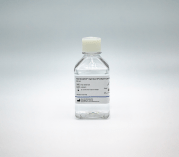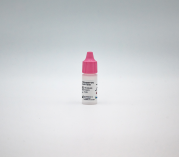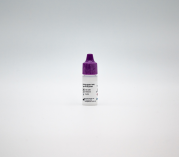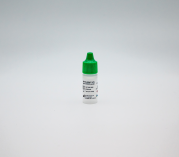The PATHO-GENE® HPV screening probe is a mixture of biotin-labeled HPV 6, HPV 11, HPV16, HPV 18, HPV 31, HPV 33, and HPV 51-specific probes in buffered formamide and hybridization enhancers.
Shipping: Available products typically ship within 24/48h, via priority shipping.
Do you need support? Contact Customer Service or Technical Support.
Online Account
Access or Create Your Account
Product Details
| Application Notes |
The ENZO PATHO-GENE® HPV screening probe employs a mixture of the HPV-specific probes that have been specificallly formulated to detect most HPV types that have been associated with anogenital papillomas. Among the HPV types detected with the PATHO-GENE® HPV screening probe are those commonly associated with benign lesions presenting as condylomas and mild dysplasia, as well as types commonly associated with cervical intraepithelial neoplasia (CIN) and carcinoma in situ (CIS). The PATHO-GENE® HPV screening probe detects but does not distinguish among HPV types that have shown to be associated with sexually transmitted papillomavirus. The probe mixture is denatured and hybridized to the tissue section fixed and pretreated on the microscope slide. Specific hybridization between the HPV DNA probe and DNA in the specimen is determined by the detection of biotin. |
|---|---|
| Technical Info / Product Notes |
HPV probe can be optimized for polymer detection system using diluent buffer, In situ hybridization buffer for HPV probes (Ready-to-Use) (Prod. No. ENZ-33905). This product or the use of this product is covered by one or more Enzo patents, including, but not limited to the following: U.S. Patent No. 4,994,373; Canadian Patent No. 1,309,672; and patents pending. |
Handling & Storage
| Use/Stability |
As indicated on product label or CoA when stored as recommended. Stable for at least one year after receipt when stored as recommended. |
|---|---|
| Long Term Storage |
+4°C |
| Shipping |
Blue Ice |
| Regulatory Status |
RUO – Research Use Only |
|---|
- Extrachromosomal Amplification of Human Papillomavirus Episomes Is a Mechanism of Cervical Carcinogenesis.: Rossi, N. M., Dai, J., et al.; Cancer Res. 83, 1768 (2023), Reactant(s): Human, Abstract
- A broad-based approach to differentiate CIN from its mimics: The utility of in situ hybridization and immunohistochemistry: G. Nuovo; Ann. Diagn. Pathol. 46, 151515 (2020), Abstract
- New biomarkers of human papillomavirus infection in acute cervical intraepithelial neoplasia: G.J. Nuovo, et al.; Ann. Diagn. Pathol. 36, 21 (2018), Abstract
- Different miRNA signatures of oral and pharyngeal squamous cell carcinomas: a prospective translational study: C.B. Lajer, et al.; Br. J. Cancer 104, 830 (2011), Abstract — Full Text
- Condyloma acuminatum associated with syringocystadenoma papilliferum: H.G. Skelton 3rd, et al.; Am. J. Dermatopathol. 16, 628 (1994), Application(s): in situ hybridization, Abstract
- Carcinomas of Bartholin’s gland. Histogenesis and the etioloical role of human papillomavirus: J.C. Felix, et al.; Am. J. Pathol. 142, 925 (1993), Application(s): in situ hybridization, Abstract — Full Text
- Detection of Epstein-Barr virus messenger RNA in Reed-Sternberg cells of Hodgkin’s disease by in situ hybridization with biotinylated probes on specially processed modified acetone methyl benzoate xylene (ModAMeX) sections: P. Brousset, et al.; Blood 77, 1781 (1991), Application(s): Used as negative controls, Abstract — Full Text
- A comparison of biotin- and 35S-based in situ hybridization methodologies for detection of human papillomavirus DNA: G.J. Nuovo, et al.; Lab. Invest. 61, 471 (1989), Application(s): in situ hybridization, Abstract
- Comparison of human papillomavirus type 1 serotyping by monoclonal antibodies with genotyping by in situ hybridization of plantar warts: A.B. Jenson, et al.; J. Cutan. Pathol. 16, 54 (1989), Application(s): in situ hybridization, Abstract
- Sensitivity of in situ detection with biotinylated probes of human papilloma virus type 16 DNA in frozen tissue sections of squamous cell carcinomas of the cervix: J.M. Walboomers, et al.; Am. J. Pathol. 131, 587 (1988), Abstract
- Detection of viral genomes in cultured cells and paraffin-embedded tissue sections using biotin-labeled hybridization probes: D.J. Brigati, et al.; Virology 126, 32 (1983), Abstract
- Enzymatic synthesis of biotin-labeled polynucleotides: novel nucleic acid affinity probes: P.R. Langer, et al.; PNAS 78, 6633 (1981), Abstract
Related Products
PATHO-GENE® HPV type 16/18/31/33/51 probe
ENZ-32882
HPV probe that can be optimized for use with polymer detection system or used as optimized RTU with Enzo’s Streptavidin detection methods.

PATHO-GENE® HPV type 6/11 probe
ENZ-32885
A mixture of biotin-labeled HPV 6 and HPV 11-specific probes for in situ hybridization

PATHO-GENE® HPV type 16/18 probe
ENZ-32886
A mixture of biotin-labeled HPV 16 and HPV 18-specific probes for in situ hybridization

PATHO-GENE® HPV type 31/33/51 probe
ENZ-32887
A mixture of biotin-labeled HPV 31, HPV 33 and HPV 51-specific probes for in situ hybridization

Last modified: May 29, 2024
Datasheet, Manuals, SDS & CofA
Manuals And Inserts
Certificate of Analysis
Please enter the lot number as featured on the product label
SDS
Enzo Life Science provides GHS Compliant SDS
If your language is not available please fill out the SDS request form
 Lab Essentials
Lab Essentials AMPIVIEW® RNA probes
AMPIVIEW® RNA probes Enabling Your Projects
Enabling Your Projects  GMP Services
GMP Services Bulk Solutions
Bulk Solutions Research Travel Grant
Research Travel Grant Have You Published Using an Enzo Product?
Have You Published Using an Enzo Product?
